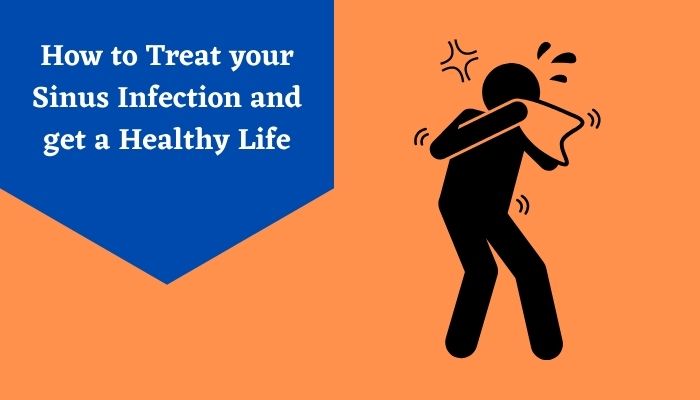Komal works in a private firm in Delhi. Komal has been suffering from a stuffy nose, runny nose, and headache for the last 15 days. She thought it may be due to the common cold, so she cared little. But her condition has not improved.
So, one of her colleagues suggested she may have sinusitis/sinus infection and should consult with an ENT for proper medications for sinus infection. After taking sinusitis infection treatment medications, Komal has recovered from sinus infection utterly.
What is sinusitis/sinus infection?
Sinusitis or sinus infection is swelling of the tissue lining your sinuses. Sinuses are void spaces between your eyes and located behind your cheekbones and in your forehead. They produce mucus that keeps your nose humid and moist. This, in turn, safeguards you against grime, allergens, pollens, and pollutants. Wholesome sinuses are filled up with air. When they are clogged and blocked with fluid, germs can grow and may develop an infection.Some Common Reasons for Sinus Blockage
- The common cold and flu
- Allergic rhinitis is responsible for swelling of the lining tissue caused by allergens
- Nasal polyps (a small growth inside the lining of your nose)
- A deviated septum that shifts in the nasal cavity
Types of Sinusitis
A sinus infection can be divided into four groups and they are:- Acute sinusitis: Under this type, you may feel cold-like symptoms like a runny, stuffy nose and facial pain. You may develop this type of sinusitis suddenly and it will last up to 4 weeks
- Subcutaneous sinusitis: This type of sinus infection usually lasts 4 to 12 weeks
- Chronic sinusitis: Here, the symptoms last for 12 weeks or longer
- Recurrent sinusitis: T3his type of sinusitis happens quite a few times in a year
Symptoms of Sinusitis
Let us understand symptoms of all acute and chronic types of sinusitis:Acute Sinusitis Symptoms
Following are the common symptoms of acute sinusitis:
- Facial pain or pressure
- Stuffy nose
- Runny nose
- Loss of smell
- Cough or congestion
- Fever
- Bad breath
- Fever
- Dental pain
This type of sinus may last up to 12 weeks or even more. Following are the symptoms experienced:
- A feeling of fullness in your face
- A nasal obstacle or nasal blockage
- Pus in the nasal cavity
- Fever
- Runny nose
- Discoloured postnasal drainage
- Headache
- Teeth pain
- Bad breath
- A feeling of fatigue/tiredness
How to overcome Sinus?
After having understood what is sinus, it is time to understand sinus infection treatment:Over-The-Counter Pain Relief Medicines
Sometimes, over-the-counter medications will help you to overcome the symptoms of sinus. Some popular OTC medicines are:
- Aspirin (only for above 18 +)
- Acetaminophen (Tylenol)
- Ibuprofen such as Advil or Motrin
Antibiotics
Your doctor may prescribe antibiotics for sinusitis treatment. You need to take them for 10-14 days to eliminate sinus infections. Common antibiotics for sinus infection are Augmentin, Zithromax, Amoxil, etc. If your sinusitis occurred due to a bacterial infection, then by taking antibiotics, your symptoms will be controlled.
Nasal Sprays
You may use OTC decongestant nasal sprays (on a short-term basis) to treat your sinus. Some nasal sprays, like steroid nasal sprays and saline, are even suitable for prolonged use. Nasal sprays minimize swelling in the nasal passages and permit mucus to drain from the sinuses.
But don’t overuse these nasal sprays. Overuse of nasal sprays may develop a condition called rebound phenomenon (swelling of nasal passage and close up). If you are pregnant or have underlying medical conditions, then consult with a physician before using nasal sprays.
Steam Inhalation
Though there is not adequate scientific evidence to claim that steam inhalation is beneficial for a sinus infection, many people opt for this method to relieve their symptoms. You just need a hot water bowl and keep a towel over your head to inhale the steam. Now, take a deep breath through your nose for 10-15 minutes. You may repeat this method 3-4 times each day.
Some people prefer to add essential oils like eucalyptus oil or peppermint oil to the water. Eucalyptus oil possesses anti-microbial and anti-inflammatory properties that may reduce infection.
Hydration
Drink plenty of fluid to keep your body hydrated while suffering from a sinus infection. You can drink several glasses of water or juice every day. But avoid soda and coffee as much as possible. Examples of fluids that you can consume while suffering from sinus are,
- Plain water
- Hot water with lemon, honey, or ginger
- Herbal teas
- Broth
Antihistamines are beneficial in treating inflammation from an allergic reaction. These medications are useful in controlling your sinus symptoms, such as minimizing swelling in the nasal passages and sinuses.
Nasal Irrigation
Nasal irrigation will also help you to overcome your sinus infection. A study was conducted in 2016 and according to it; people who used nasal irrigation had fewer symptoms, fewer headaches, and were less likely to need OTC medications. People can use a net pot or may rinse a bottle for nasal irrigation.
Rest
Adequate rest is needed for people who are suffering from sinus infections. While resting, your body will recover fast and will utilize its energy for fighting the infection.
Warm Compress
You may use a warm compress to your face to get rid of pain and pressure from the clogged sinuses. This is a quick-relief sinus infection treatment.


